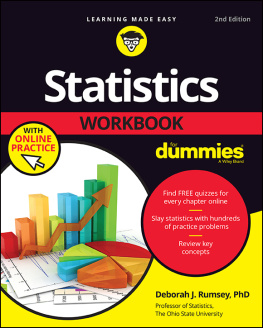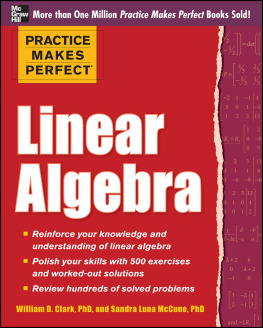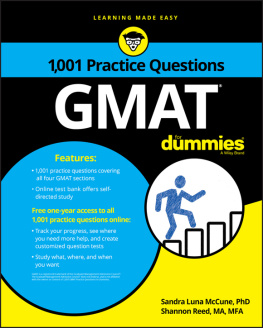McCune - Practice Makes Perfect Statistics
Here you can read online McCune - Practice Makes Perfect Statistics full text of the book (entire story) in english for free. Download pdf and epub, get meaning, cover and reviews about this ebook. City: New York, year: 2010, publisher: McGraw-Hill, genre: Children. Description of the work, (preface) as well as reviews are available. Best literature library LitArk.com created for fans of good reading and offers a wide selection of genres:
Romance novel
Science fiction
Adventure
Detective
Science
History
Home and family
Prose
Art
Politics
Computer
Non-fiction
Religion
Business
Children
Humor
Choose a favorite category and find really read worthwhile books. Enjoy immersion in the world of imagination, feel the emotions of the characters or learn something new for yourself, make an fascinating discovery.

Practice Makes Perfect Statistics: summary, description and annotation
We offer to read an annotation, description, summary or preface (depends on what the author of the book "Practice Makes Perfect Statistics" wrote himself). If you haven't found the necessary information about the book — write in the comments, we will try to find it.
McCune: author's other books
Who wrote Practice Makes Perfect Statistics? Find out the surname, the name of the author of the book and a list of all author's works by series.
Practice Makes Perfect Statistics — read online for free the complete book (whole text) full work
Below is the text of the book, divided by pages. System saving the place of the last page read, allows you to conveniently read the book "Practice Makes Perfect Statistics" online for free, without having to search again every time where you left off. Put a bookmark, and you can go to the page where you finished reading at any time.
Font size:
Interval:
Bookmark:
PRACTICE MAKES PERFECT
Statistics
Statistics
Sandra McCune, Ph.D.


Copyright 2010 by The McGraw-Hill Companies, Inc. All rights reserved. Except as permitted under the United States Copyright Act of 1976, no part of this publication may be reproduced or distributed in any form or by any means, or stored in a database or retrieval system, without the prior written permission of the publisher.
ISBN: 978-0-07-163817-3
MHID: 0-07-163817-2
The material in this eBook also appears in the print version of this title: ISBN: 978-0-07-163818-0, MHID: 0-07-163818-0.
All trademarks are trademarks of their respective owners. Rather than put a trademark symbol after every occurrence of a trademarked name, we use names in an editorial fashion only, and to the benefit of the trademark owner, with no intention of infringement of the trademark. Where such designations appear in this book, they have been printed with initial caps.
McGraw-Hill eBooks are available at special quantity discounts to use as premiums and sales promotions, or for use in corporate training programs. To contact a representative please e-mail us at bulksales@mcgraw-hill.com.
Trademarks: McGraw-Hill, the McGraw-Hill Publishing logo, Practice Makes Perfect and related trade dress are trademarks or registered trademarks of The McGraw-Hill Companies and/or its affiliates in the United States and other countries, and may not be used without written permission. All other trademarks are the property of their respective owners. The McGraw-Hill Companies is not associated with any product or vendor mentioned in this book.
Interior design by Village Bookworks, Inc.
Interior illustrations by Glyph International
TERMS OF USE
This is a copyrighted work and The McGraw-Hill Companies, Inc. (McGraw-Hill) and its licensors reserve all rights in and to the work. Use of this work is subject to these terms. Except as permitted under the Copyright Act of 1976 and the right to store and retrieve one copy of the work, you may not decompile, disassemble, reverse engineer, reproduce, modify, create derivative works based upon, transmit, distribute, disseminate, sell, publish or sublicense the work or any part of it without McGraw-Hills prior consent. You may use the work for your own noncommercial and personal use; any other use of the work is strictly prohibited. Your right to use the work may be terminated if you fail to comply with these terms.
THE WORK IS PROVIDED AS IS. McGRAW-HILL AND ITS LICENSORS MAKE NO GUARANTEES OR WARRANTIES AS TO THE ACCURACY, ADEQUACY OR COMPLETENESS OF OR RESULTS TO BE OBTAINED FROM USING THE WORK, INCLUDING ANY INFORMATION THAT CAN BE ACCESSED THROUGH THE WORK VIA HYPERLINK OR OTHERWISE, AND EXPRESSLY DISCLAIM ANY WARRANTY, EXPRESS OR IMPLIED, INCLUDING BUT NOT LIMITED TO IMPLIED WARRANTIES OF MERCHANTABILITY OR FITNESS FOR A PARTICULAR PURPOSE. McGraw-Hill and its licensors do not warrant or guarantee that the functions contained in the work will meet your requirements or that its operation will be uninterrupted or error free. Neither McGraw-Hill nor its licensors shall be liable to you or anyone else for any inaccuracy, error or omission, regardless of cause, in the work or for any damages resulting there from. McGraw-Hill has no responsibility for the content of any information accessed through the work. Under no circumstances shall McGraw-Hill and/or its licensors be liable for any indirect, incidental, special, punitive, consequential or similar damages that result from the use of or inability to use the work, even if any of them has been advised of the possibility of such damages. This limitation of liability shall apply to any claim or cause whatsoever whether such claim or cause arises in contract, tort or otherwise.
To my beloved parents
Joe and Kathryne Luna
Practice Makes Perfect Statistics is designed as a tool for review and practice in statistics for the beginner or intermediate learner of statistics. It is not intended to introduce concepts, but rather it is meant to reinforce what already has been presented to readers. The topics offered are those that a competent user of statistics needs to know. To that end, this practice workbook is a useful supplementary text for introductory courses in statistics. It can also serve as a refresher text for readers who need to review previously learned statistical concepts and techniques.
Like most topics worth knowing, learning statistics requires diligence and hard work. The foremost purpose of Practice Makes Perfect Statistics is as a source of solved statistics problems. I believe that the best way to develop understanding, while, at the same time, acquiring accuracy and speed in statistics is to work numerous practice exercises. This book has more than 500 practice exercises from beginning to end. A variety of exercises and levels of difficulty are presented to provide reinforcement of statistical concepts. In each unit, a concept discussion followed by example problems precedes each set of exercises to serve as a concise review for readers already familiar with the topics covered. Concepts are broken into basic components to provide ample practice of fundamental skills.
To use Practice Makes Perfect Statistics in the most effective way, it is important that you work through every exercise. After working a set of exercises, use the worked-out solutions to check your understanding of the concepts. I sincerely hope that this book will help you acquire greater competence and confidence in using statistics in your future endeavors.
Sandra Luna McCune, Ph.D.
Descriptive statistics is the branch of statistics that focuses on describing, summarizing, and organizing information. Part I discusses various aspects of descriptive statistics.
Data is a term used to describe information that derives from some form of measurement (counting, using a standard scale, sorting into categories, rank ordering, and so on). You can classify data in several ways according to various qualities. You might classify data as quantitative or qualitative; discrete or continuous; or nominal, ordinal, interval, or ratio level. This chapter describes these different ways of classifying data.
You can classify data as either quantitative or qualitative. Quantitative data are counts or measurements for which representation on a numerical scale is naturally meaningful. Qualitative data consist of labels, category names, ratings, rankings, and such for which representation on a numerical scale is not naturally meaningful. Distinguishing data as quantitative or qualitative is an important skill in statistics.
PROBLEMS
For ae, classify the data as quantitative or qualitative.
a. Daytime temperature readings (in degrees Fahrenheit) in a 30-day period
b. Heights (in centimeters) of plants in a plot of land
c. Satisfaction ratings (on a scale from not satisfied to very satisfied) by users of a website
d. Number (0, 1, 2, or so on) of people attending a conference
e. Party affiliation (Republican, Democrat, Libertarian, or so on) of voters
Next pageFont size:
Interval:
Bookmark:
Similar books «Practice Makes Perfect Statistics»
Look at similar books to Practice Makes Perfect Statistics. We have selected literature similar in name and meaning in the hope of providing readers with more options to find new, interesting, not yet read works.
Discussion, reviews of the book Practice Makes Perfect Statistics and just readers' own opinions. Leave your comments, write what you think about the work, its meaning or the main characters. Specify what exactly you liked and what you didn't like, and why you think so.




